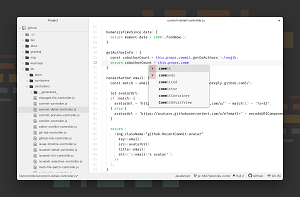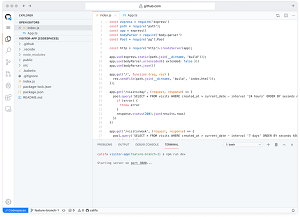News
GitHub Killing Atom Code Editor for Cloud Tools
Microsoft-owned GitHub announced it will sunset its popular Atom "hackable text editor" late this year as it concentrates on cloud-based dev tooling.
As a desktop application, Atom just had no viable future in today's cloud-focused computing world, with GitHub yesterday (June 8) saying "we've decided to retire Atom in order to further our commitment to bringing fast and reliable software development to the cloud via Microsoft Visual Studio Code and GitHub Codespaces."
It's ironic that cloud-hosted VS Code is part of the future while Atom isn't, as Atom tech was closely tied to the Electron project (formerly named Atom Shell), whose bits were used as the basis for many popular programs -- including VS Code itself. In addition, Electron served as the foundation for programs including Slack, WordPress Desktop, Discord, Skype, Facebook Messenger and many others including -- more irony -- GitHub Desktop.
 [Click on image for larger view.] Atom (source: GitHub).
[Click on image for larger view.] Atom (source: GitHub).
"Atom has not had significant feature development for the past several years, though we've conducted maintenance and security updates during this period to ensure we're being good stewards of the project and product," GitHub said. "As new cloud-based tools have emerged and evolved over the years, Atom community involvement has declined significantly. As a result, we've decided to sunset Atom so we can focus on enhancing the developer experience in the cloud with GitHub Codespaces."
As part of the cloudy development future, GitHub Codespaces debuted a couple years ago as a fully featured, cloud-hosted dev environment -- providing "the full Visual Studio Code experience" -- directly within GitHub, a software development platform and code repository with an open source focus. GitHub describes Codespaces as "Visual Studio Code backed by high performance VMs that start in seconds."
 [Click on image for larger view.] GitHub's Codespaces (source: GitHub).
[Click on image for larger view.] GitHub's Codespaces (source: GitHub).
And Codespaces isn't the only online dev tool based on VS Code, as Microsoft last year announced Visual Studio Code for the Web, said to provide "a free, zero-install Microsoft Visual Studio Code experience running entirely in your browser, allowing you to quickly and safely browse source code repositories and make lightweight code changes."
 [Click on image for larger view.] VS Code for the Web (source: Microsoft).
[Click on image for larger view.] VS Code for the Web (source: Microsoft).
GitHub even made it ridiculously easy to fire up VS Code in the browser with this trick: From any repo or pull request, developers can simply press the period (.) key to bring up the browser-based VS Code environment with the source code file ready for editing.
All of the above served to ring the death knell for Atom, whose site FAQ clearly states: "The Atom team has no plans to make a cloud- or server-based version of Atom."
Going forward, GitHub announced sunsetting and migration plans:
- Today, we're announcing the sunset date six months out.
- Over the next six months, we'll continue to inform Atom users of the sunset in the product and on atom.io.
- On December 15, 2022, we will archive the atom/atom repository and all other repositories remaining in the Atom organization.
"GitHub and our community have benefited tremendously from those who have filed issues, created extensions, fixed bugs, and built new features on Atom," the company said. "Atom played an integral part in many developers' journeys, and we look forward to building and shaping the next chapter of software development together."
About the Author
David Ramel is an editor and writer at Converge 360.